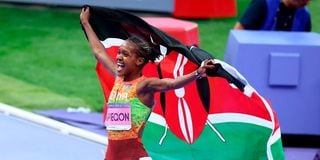Premium
Athletes need to plan beyond their competition days and glory years

Kenya's Faith Kipyegon celebrates after winning gold at the Paris 2024 Olympic Games on August 10, 2024.
What you need to know:
- At NOC-K, we wish the 13 athletes representing Kenya all the best in their quest for glory.
- More importantly, we celebrate their gallant efforts to look beyond their disabilities and inspire the world and the nation with their excellence.
The Paris Olympic Games ended two weeks ago, and for sports lovers and fans like us, it's time to think about what to do with our lives after an intense and exciting three weeks of action that only comes around once every four years.
Most of us are having after sports event blues. Where you try and remember what you used to do before the Games.
It happens to me after Olympics and Fifa World Cup.
There's a group of people who are impacted by this reality more than others -- the Olympians of 2024.
They might be wondering if they'll be able to compete in the 2028 Olympics. Will their strength, agility, and age allow them to continue?
Others whose Olympic journey remains a dream may be questioning if their best effort will be enough in four years, especially considering the advancements in technology and science that have led to incredible performances at the Paris Olympics. Despite it being a championship, records were still broken.
Considerations
Given all of these considerations, it's obvious that career transition planning is essential for athletes.
Firstly, athletic careers typically last for a relatively short period of time compared to many traditional careers.
The risk of injuries and the physical demands of elite performance can limit an athlete's time in sports.
Therefore, preparing for a career transition ensures that athletes have viable career options once their active athletic days end.
Athletes often struggle with uncertainties regarding their financial stability and security, as well as with issues such as losing their athletic identity and adapting to different routines.
These challenges can take a toll on their emotional well-being.
It's important for athletes to receive training to better prepare them to handle these challenges when they arise.
Athletes have natural attributes and sport skills that can be applied to various careers. These include discipline, self-motivation, focus, goal orientation, and the pursuit of excellence.
Other valuable skills may include diverse thinking from exposure to different cultures through travel, agility in both physical movement and mental flexibility, among others.
The National Olympic Committee will continue its educational activities this weekend by hosting a career transition workshop for athletes who participated in the Paris Olympics and athletes from other sports.
The education programme, named Career+ (Plus), aims to assist elite athletes in preparing for and achieving success during their career transition.
The programme focuses on helping athletes identify and maximize their skill sets, education, and employment opportunities, leveraging on their sports careers to excel.
The workshop is hosted under the auspices of the NOC-K Athletes Commission led by Athlete Representative and Executive Member, Humphrey Kayange. The course is facilitated by an Athlete 365 educator, Kady Kanoute – an Olympian from Beijing 2008 and former professional basketball player from Mali.
She is a promoter of the IOC Athletes Commission Outreach Programme delivering Career Plus education all over the world.
The workshop aims at helping athletes invest in their lives beyond sport! While at it, the Paralympic Games opened last Wednesday.
At NOC-K, we wish the 13 athletes representing Kenya all the best in their quest for glory.
More importantly, we celebrate their gallant efforts to look beyond their disabilities and inspire the world and the nation with their excellence.
Mutuku is Secretary General of NOC-K. [email protected]





